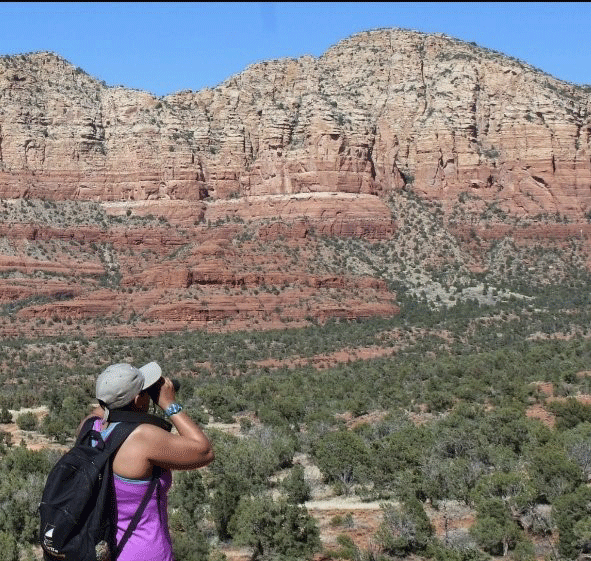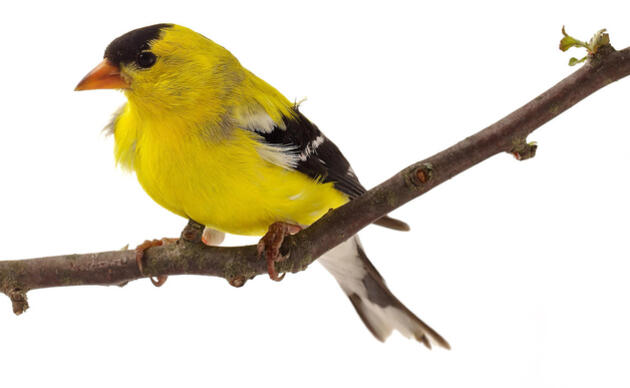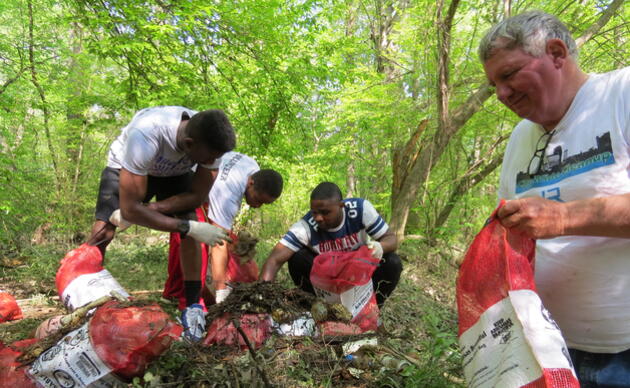By: Juita Martinez, Kassandra Ford and Tykee James
A Black birder (@JasonWardNY), striving for representation in and around STEM fields, took it upon himself to virtually connect friends and like-minded colleagues into a conversation centered around science, nature, and social issues. The members of this group, all Black nature enthusiasts, initiated #BlackBirdersWeek to bring attention to the inherent racism still present in modern American outdoor spaces.
Some of us have just begun our birding journeys while others are seasoned pros, but we have all come together to promote a common goal - to change the narrative of Black people exploring the outdoors. Utilizing outdoor spaces is a normal part of life for some but unknown to most, it can take a significantly different form for those of us who are Black. We constantly have to practice our “speeches” for interactions with police officers and the public, think about the potential outcomes as a result of the gear we carry, and yes, even prepare for the racist interactions we face on a regular basis. The health benefits and the simple joy of disconnecting from technology by exploring nature are some of the easiest and best pastimes the world has to offer, but for Black people, it's not quite that simple.

Picture this. You’re walking through your usual hiking trail, one you’ve hiked a hundred times, and one day you notice a couple of glances from other hikers. Nothing blatant, and no one says anything, so you move on and continue your hike. About ten minutes later, you get the feeling like someone is following you. What do you do? What goes through your mind? Does any of that change when you realize it’s a police officer?
This is what our nightmares are made of. We are alone, in a place without witnesses, carrying equipment that could be construed as being used for criminal activity, and about to have an encounter with law enforcement. If this situation did not immediately bring you feelings of severe apprehension and fear, that is a privilege.
As Black people who also enjoy the outdoors, we constantly ask ourselves how we can make our presence more acceptable. We monitor our outfits, equipment, study sites, and the times we visit outdoor locations, all in an effort to appear less “threatening.”
Here are our stories:
From the barrier islands of Louisiana, third year PhD student Juita Martinez (@JuitaMartinez) docks a 22’ boat to gas up for another round of sampling only to find herself constantly dismissed by fishermen as her white male field technician is treated like the project manager. “It’s a strange feeling knowing that your hard work and years of dedication to an entire field is overlooked by a large majority of people just because of the color of your skin. I wish people would recognize that black women have positions that were historically only allowed for white men, such being a field biologist. Black people are no longer on the sidelines or prevented from doing this work, instead we are leading the way.” In these situations, her field technician deflects questions to her, as he isn’t experienced enough to answer them, and oftentimes they are met with confused looks. Public engagement and exposure is crucial, so the average person can recognize that anyone, regardless of race, can be a nature enthusiast.
On an early morning stop, pediatric night shift nurse Atiya Wells (@Backyard_Base) spotted two hawks in a parking lot near her organization, Backyard Basecamp Inc. As any nature enthusiast would, she begins to bird from her car, binoculars in one hand and a camera in another- anything to get a better look at these magnificent birds. Her birding experience was cut short when she realized the potential danger she was in by carrying her equipment. “These hawks let me get about 20 feet from them before they flew off and landed onto the branches of a dying tree in the forest. It was gray and a little hazy and I couldn't tell if they were Red-tailed or Red-Shouldered hawks. I remember thinking, here I am standing on this hill looking past people's homes...into the woods...with a camera...in the rain...at 7:30 in the morning. If someone sees me, they'll probably think I'm scoping out their house or something.”
Bird watching was the start of Tykee's (@Tykee_James) path to environmental advocacy. His first job as an environmental educator in his neighborhood park in Philadelphia, he found strong motivation in observing how environmental health reflected community health. He discusses his background on that principle and other political wildlife conservation topics on his podcast: On Word for Wildlife. "We didn't pick our moment, but we will rise to the occasion. I remember being mistaken for the catering service member after speaking on stage at a major donor event. The service was excellent that night, and I thought no one could mistake their white shirts, black ties, and black pants as their uniform with what I was wearing: a dark blazer with a grey tie and blue jeans. The only thing we had in common was our skin tone."
Alex Troutman (@N8ture_AL), a master’s student at Georgia Southern University, recalls birding on the Gulf Coast to test out a new telephoto lens. “Almost to the snap of my shutter, I heard footsteps. After taking a few sets of pictures, I looked around and noticed that everyone had left me on the viewing platform. No one had actually left the park, but they were all standing sporadically on the boardwalk. Wanting to be sure that I was the reason they left, I left the viewing platform and started taking pictures on the boardwalk. Before I had a chance to put my camera to my face, people walked past me and up the viewing platform. That hurt me, not only that they left me on the viewing platform, but they thought so less of me that they did not want me in their vicinity. After that I just went home and was done birding for a few days.”
Biology PhD candidate Kassandra Ford (@KasstheFish) remembers a time when she was the teaching assistant for a university lab course that was scheduled to visit private property in South Louisiana for field work. “The professor in charge let me know where the planned stops would be, and a red flag popped up in my head. I knew a group of diverse students arriving with strange equipment and gear, especially with only one white instructor, would be a dangerous situation in any rural location, much less on private property. I knew I had to contact that property owner and let him know there would be a large group of people coming who would look like university undergraduates. Luckily the owner was happy to have us but did mention that he appreciated being told ahead of time before strangers showed up at his house. These are the kinds of things that white people don't always realize are potentially dangerous, and even lethal, situations.”
As Black birders and nature enthusiasts, we enjoy the excitement that comes with the unknowns of which bird or animal we can spot next. In recent weeks, multiple events have sparked a desire within our group (@BlackAFinSTEM) to create change, starting with #BlackBirdersWeek. Our stories all share a common narrative: outdoor spaces are not the same for Black people. Because of the color of our skin, we are at risk when exploring the outdoors because we are perceived as being a threat. So, the next time you go outdoors to enjoy nature, walk your dog, or go for a hike, remember Black people deserve safe access to these experiences as well.
Donate to Audubon Delta's Work
Help secure the future for birds at risk from climate change, habitat loss and other threats. Your support will power our science, education, advocacy and on-the-ground conservation efforts.




